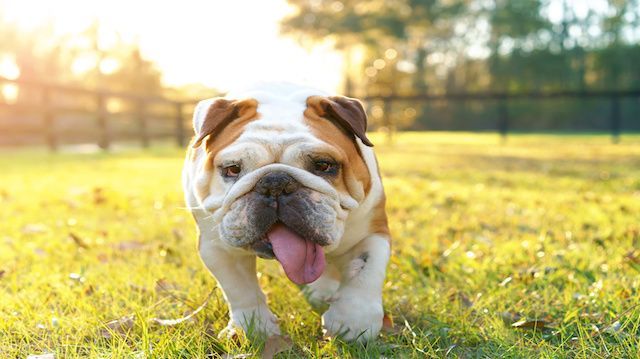
There are plenty of ornamental plants that are dangerous to pets, but you can make sure they aren’t in your yard or your dog can’t get to them. That’s not the case with weeds. If your pet exhibits any symptoms of exposure to or consumption of poisonous plants, take him to an emergency veterinarian immediately.
Cowbane
Also known as water hemlock and poison parsnip, cowbane is among the deadliest of weeds, and the entire plant is poisonous. This wildflower is usually found in wetlands. It contains cicutoxin and cicutol, toxins that affect the central nervous system. Signs of toxicity include the following:
- seizures
- agitation
- weakness
- dilated pupils
- breathing difficulties
Death ensues from respiratory paralysis.
Deadly nightshade
The name says it all. Nightshade causes serious gastrointestinal problems, along with behavioral changes, convulsions and a slowed heart rate. Just one leaf or a few berries can kill your dog, and it takes about the same amount to kill a person. Also known as belladonna, the plant prefers shady, moist areas, especially in soils rich in limestone.
Foxtails
Foxtails are among the most dangerous plants for dogs, and they aren’t necessarily eaten. This weed is primarily found west of the Mississippi River. Once the sharp, barbed seeds of the foxtail stick become imbedded in your pet, they can cause abscesses and infection. If a seed goes up your dog’s nose — a common occurrence when sniffing — it can eventually travel to his brain and kill him. If you live in an area where foxtails are common, check your dog and yourself thoroughly after outings. Inspect the paws and face especially carefully. If you find a foxtail head, remove it with tweezers. If the area appears swollen or you can’t get the seed head out, take your dog to the vet. Dogs who have inhaled foxtails may suffer nasal discharge or frequent sneezing.
Milkweed
This common weed contains cardiac glycoside toxins, poisons that directly affect the heart. Every part of the plant is dangerous. The following are signs of milkweed poisoning:
- abnormal heart rhythm
- seizures
- gastrointestinal issues
- dilated pupils
- collapse
While milkweed can kill mammals, it’s a favorite of Monarch butterflies and other insects. If you install a butterfly garden, make sure your dog can’t get near it.
Pokeweed
This plant is found primarily in the eastern part of the US. It prefers rich soils and is often found in forests and along farm fields. All parts of pokeweed are poisonous, not just the berries. The plant contains the toxins oxalates and saponins. Indications of pokeweed poisoning include the following:
- vomiting and diarrhea
- tremors
- excess salivation
- low blood pressure
If your dog eats a large amount of pokeweed, he could go into a coma and die.
Poison hemlock
If you recall, Socrates killed himself by drinking a concoction of poison hemlock. Poison hemlock thrives on poor soils, and is often found on roadsides or near ditches or other wet areas. Signs of poisoning begin very soon after ingestion:
- uncontrolled urination and bowel movements
- excitation
- muscle tremors
- breathing difficulties
Within a short time, muscle paralysis occurs, with death soon following.
Skunk cabbage
Skunk cabbage, also known as polecat weed or swamp cabbage, grows in wet areas. Its toxic properties consist of insoluble calcium oxalate crystals. Once the dog bites into the plant, the crystals penetrate his mouth tissues. Signs of canine skunk cabbage consumption include the following:
- oral irritation
- drooling
- vomiting
- difficulty swallowing
These signs appear immediately after the skunk cabbage is chewed. In a worst-case scenario, the dog’s airway swells up so that he can’t breathe.
While it’s important to keep harmful weeds out of your backyard, dousing them with chemicals is not the way to eradicate them. If your property is small, pull them out by hand. For larger acreage, use natural herbicides such as table salt, diluted borax or white vinegar.
—Jane Meggitt
Jane Meggitt graduated from New York University and worked as a staff writer for a major New Jersey newspaper chain. Her work on pets, equines and health have appeared in dozens of publications, including The Daily Puppy, The Nest Pets, Horse News, Hoof Beats and Horseback magazines.
Sources:
http://www.aspca.org/pet-care/animal-poison-control/toxic-and-non-toxic-plants?field_toxicity_value%5B%5D=01&=Apply
http://www.petpoisonhelpline.com/poison/skunk-cabbage
http://pets.webmd.com/dogs/foxtail-grass-and-your-dog
http://www.canidae.com/blog/2010/05/grass-weeds-and-plants-pets-should-not-eat

